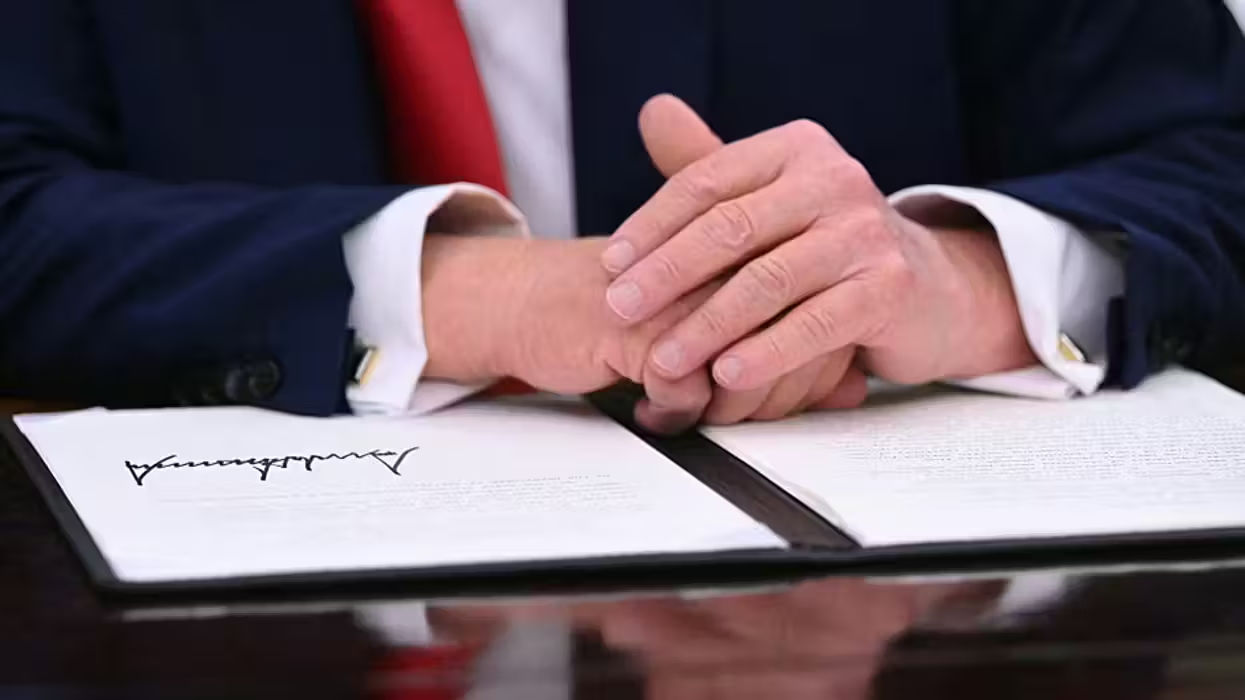
© 2025 Blaze Media LLC. All rights reserved.
Editor's note: Below is a condensed excerpt from the sixth chapter "Is the Tea Party Nation Anti-Gay?" of David Lampo's new book "A Fundamental Freedom:Why Republicans, Conservatives, and Libertarians Should Support Gay Rights." Released by Rowan & Littlefield Publishers this month, "A Fundamental Freedom" provides a serious and important analysis of gay rights and marriage equality from a libertarian perspective.
One of the the most striking political developments since the election of President Barack Obama has been the birth of the Tea Party movement, perhaps the most momentous political development in the past several years. It is, for the most part, a decentralized coalition of organizations, activists, and aspiring politicians primarily from the right side of the political spectrum, ranging from libertarians to mainstream conservatives to right-wing populists to Christian conservatives. Millions of fed-up Americans have rallied under the Tea Party banner to take a stand against the enormous growth in federal spending and debt over the past decade, especially during the Obama administration.
Not surprisingly, the Tea Party movement has aroused the opposition and hatred of the liberal Left. Contrary to liberal conventional wisdom, however, the Tea Party movement is as much an insurgent movement within and against the Republican Party as it is against the progressive Left and President Obama. Its broad ideological makeup means it is a far more complex movement than its opponents, and even some of its supporters, realize. It has many strains and offshoots, but two main characteristics define it.
The first main characteristic of the Tea Party is its overwhelming emphasis on economic issues, not social. From its very beginning, economic issues spurred its growth: government bailouts like the Troubled Asset Relief Program, the huge increases in federal debt, President Obama’s health-care “reform” bill, the $1 trillion stimulus spending, and increased economic intervention have all added heat to the fire. Notably absent have been the social issues long associated with conservative religious organizations, particularly gay marriage. As Kate Zernike wrote in the New York Times on March 12, 2010, “God, life, and family get little if any mention in [Tea Party] statements and manifestos. The motto of the Tea Party Patriots, a large coalition of Tea Party groups, is ‘fiscal responsibility, limited government, and free market.’” She added, “Tea Party leaders argue that the nation can ill afford the discussion about social issues when it is passing on enormous debts to future generations. But the focus is also strategic: leaders think they can attract independent voters if they stay away from divisive issues.” That alone makes the Tea Party strikingly different from the bulk of the mainstream social conservative movement.
There has been little evidence of an overt anti-gay prejudice or agenda in the ranks or the leadership of the Tea Party movement, despite the various accusations from the Left that the movement is rife with homophobes and racists. In fact, many gay conservatives and gay Republicans have participated in the movement since its inception. Bruce Carroll, a blogger for the gay conservative GayPatriot website, says that in all the Tea Party events he’s attended, he’s never heard anti-gay statements. Mark Ciavola, the spokesman for another gay conservative blog called Right Pride, agrees. He also believes that engaging Tea Party activists about the economic issues and concerns they share is the best way to talk to them about other issues like gay rights.
This is not to say, of course, that most of the millions of Tea Party members are necessarily pro–gay rights, let alone pro–gay marriage. The various polls of the Tea Party’s members that have been done on same-sex marriage, for example, show a level of support that varies but is about the same as, or a bit less than, that of Republicans at large, a quarter to a third of whom support same-sex marriage according to recent polls. And in contrast to the angry response from most conservative organizations to the 2010 federal court ruling in Massachusetts overturning part of the Defense of Marriage Act (DOMA), the response of most Tea Party groups was quite muted.
 In the Massachusetts case, Judge Joseph L. Tauro argued that Section 2 of DOMA violates the right of same-sex couples to equal protection under the law and therefore interferes with the traditional right of states to set their own marriage policies. Some Tea Party leaders even publicly supported the decision by Judge Tauro because they agreed with the judge that it violated the Constitution’s Tenth Amendment, which grants states jurisdiction in matters like marriage. This decision, if it is upheld, has enormous implications for a whole host of federal interventions into state matters, and many conservatives understand and support the potential of this decision to overturn a long history of federal encroachment on states’ rights. These are conservatives who are consistent in their support of federalism, even if they may disagree with how some states will handle the issue of gay marriage, a far cry from many in the Religious Right who put their anti-gay views above all else, states’ rights be damned.
In the Massachusetts case, Judge Joseph L. Tauro argued that Section 2 of DOMA violates the right of same-sex couples to equal protection under the law and therefore interferes with the traditional right of states to set their own marriage policies. Some Tea Party leaders even publicly supported the decision by Judge Tauro because they agreed with the judge that it violated the Constitution’s Tenth Amendment, which grants states jurisdiction in matters like marriage. This decision, if it is upheld, has enormous implications for a whole host of federal interventions into state matters, and many conservatives understand and support the potential of this decision to overturn a long history of federal encroachment on states’ rights. These are conservatives who are consistent in their support of federalism, even if they may disagree with how some states will handle the issue of gay marriage, a far cry from many in the Religious Right who put their anti-gay views above all else, states’ rights be damned.
There is other evidence as well of a general tolerance on gay issues on the part of many Tea Party activists. A Montana Tea Party group recently kicked out one of its board members for remarks that seemingly condoned anti-gay violence. In Texas, a bastion of hard-core Republican conservative theocrats, the Republican Party recently replaced its “Schlaflyite culture warrior” chairman (in the words of author and journalist Jonathan Rauch) with a more traditional Reaganite who emphasized economic issues over social ones. As a Dallas Tea Party leader told Rauch, “We do not touch on social issues. We believe the biggest danger to the country is the fiscal irresponsibility that’s going on in Washington.”
This more tolerant attitude on gay issues partly reflects the other main characteristic of the Tea Party movement: the strong and pervasive libertarian influence. Libertarians helped form the core of the early Tea Party movement, and they have struggled to keep it true to its roots, including a respect for equal rights under the law and social tolerance. The recent attention in the Tea Party movement paid to the Tenth and Fourteenth amendments, for example, is a by-product of the libertarian influence on both the movement and, increasingly, the Republican Party. Rarely were these amendments a topic of serious discussion in the past forty or fifty years in the Republican Party before they bubbled up from the grass roots in the past few years as an issue of great importance. These amendments are now the focus of intense discussion in the Republican Party and in the broader conservative movement thanks to the more libertarian elements of the Tea Party movement and its back-to-constitutional-basics philosophy.
The more that Republicans, conservatives, and libertarians focus on the economic issues that unite us, the sooner we will reach our goals of smaller government, lower taxes, and more personal freedom. Ultimately, however, supporters of legal equality for gays and lesbians must impress upon all Republicans that support for gay rights is an integral part of the pro-freedom, limited government philosophy we all profess to believe in.
Want to leave a tip?
We answer to you. Help keep our content free of advertisers and big tech censorship by leaving a tip today.
Want to join the conversation?
Already a subscriber?
more stories
Sign up for the Blaze newsletter
By signing up, you agree to our Privacy Policy and Terms of Use, and agree to receive content that may sometimes include advertisements. You may opt out at any time.
Related Content
© 2025 Blaze Media LLC. All rights reserved.
Get the stories that matter most delivered directly to your inbox.
By signing up, you agree to our Privacy Policy and Terms of Use, and agree to receive content that may sometimes include advertisements. You may opt out at any time.






